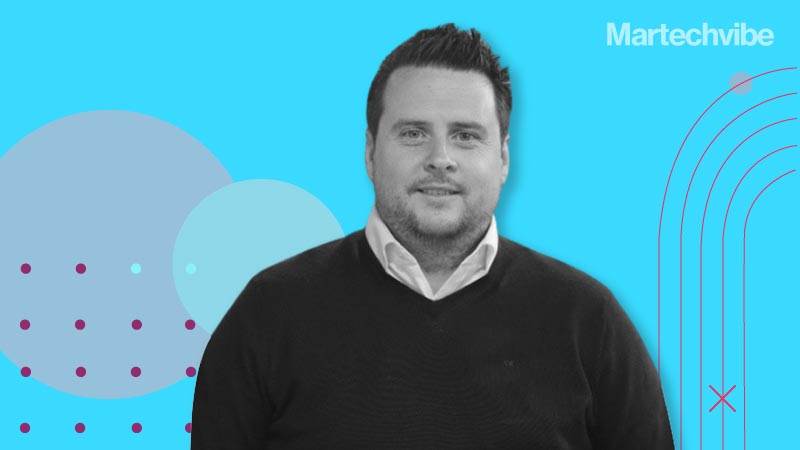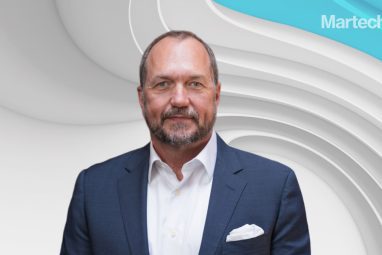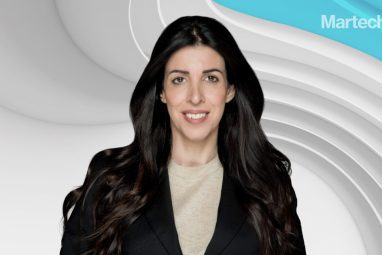Middle East Customers Expect Ownership Of Their Data
“Digital transformation is more than a buzzword,” says Robbie Kearns, Senior Regional Vice President at Salesforce. In the Middle East, organisations that listen to customers and respond with empathy and understanding enjoy better business outcomes. In this interview, he speaks about how organisations can connect with customers at various touchpoints to become more resilient, enhance […]
Topics
What to Read Next

“Digital transformation is more than a buzzword,” says Robbie Kearns, Senior Regional Vice President at Salesforce. In the Middle East, organisations that listen to customers and respond with empathy and understanding enjoy better business outcomes. In this interview, he speaks about how organisations can connect with customers at various touchpoints to become more resilient, enhance growth, and deliver innovative products and services.
What are the biggest consumer trends you have observed since 2020? How can brands stay agile to react to such trends?
We are observing a number of major consumer trends in the Middle East especially in the shift to digital over the past year.
Since 2020, Middle East customers’ digital expectations have grown. In turn, employees are feeling more pressure to meet customers’ demands, and they are turning to AI and workflow automation. The Vibe MarTech Fest is a key platform to illustrate how Middle East brands need to stay agile.
Digital transformation is more than a buzzword — the pandemic has accelerated digital transformation across the board. Worldwide, 87 per cent of consumers and business buyers expect companies to accelerate digital initiatives due to COVID-19, according to our Trends in Workflow Automation Report. Already, a majority of service decision makers said they have a fully defined AI plan in line with their digital transformation roadmaps.
Customers expect their brands to take a digital first approach. In the UAE, for example, according to our 2020 State of the Connected Customer Report, 81 per cent of customers say COVID-19 elevated their expectation of digital capabilities, and 91 per cent expect their companies to go digital. However, one of the biggest challenges is that nearly half, 45 per cent of customers say it feels like sales, service, and marketing do not share information.
What can brands do? Middle East customers expect more transparency and ownership of their data, and in turn for organisations to listen and respond to their customers with more empathy and understanding. We see that Middle East organisations that connect customers at various touchpoints can become more resilient, enhance their growth, and deliver innovative products and services.
How is Salesforce helping brands prepare for the post-pandemic world?
Salesforce is dedicated to empowering Middle East brands to navigate through ways of working amid the pandemic and as the region begins to enter the post-pandemic era. Sales professionals are especially seeing their roles shift. In the UAE, our 2020 State of Sales report shows that 80 per cent of sales professionals say success metrics have changed as a result of current economic trends, and 56 per cent expect their roles to be permanently changed as well.
Across the Middle East, marketing transformation is facing unprecedented speed and magnitude. In the UAE, 76 per cent of marketers have been leading customer experience initiatives across their companies, according to our 2020 State of Marketing report.
As Middle East market demands continue to evolve, Salesforce and our partners are seeing strong regional interest in our Customer 360 platform. Digital leaders can use the Customer 360 platform to transform their customer engagement and accelerate growth in the all-digital, and work-from-anywhere world.
Also Read: Retail Disruption – Key Challenges Facing Retailers in the Middle East
How can brands blend online and in-store experiences seamlessly?
We are definitely seeing major growth in eCommerce and online engagement for Middle East brands. As Middle East retailers and consumers have moved online over the past year due to the pandemic, there has been a surge in eCommerce but that is also causing brands to rethink in-store experiences.
Our Salesforce – Q2 2021 Shopping Index shows that worldwide, year-over-year global digital revenue grew by a modest 2 per cent, after posting four consecutive quarters of growth greater than 50 per cent.
Online habits that consumers formed over the past year are here to stay. That’s why we expect Middle East retailers and malls to continue to scale their investments in digital, while refocusing the in-store experience. Ultimately, we believe that stores must offer a balance of contactless and immersive experiences to cater to the differing needs of consumers.
Which industries do you see leading the way in digital transformation in the Middle East? What can we expect in the future?
The Middle East’s economy is set to rebound post-pandemic and continue to diversify in line with nationwide digital transformation visions. In conversations with our customers across the Middle East, we see strong industry growth in the retail, travel and tourism, and construction sectors. Among our leading customer examples of digital transformation include:
AlMalki Group, a Saudi-based family-owned group that specialises in the luxury retail and distribution market for more than 105 international brands. AlMalki Group is using Salesforce Service Cloud, Marketing Cloud, Commerce Cloud, Salesforce CMS, and Mulesoft solutions to enhance omnichannel journeys for millions of customers across the region.
The Riyadh-based Seera Group (formerly Al Tayyar Travel Group), the leading travel group in the Middle East, is using Tableau data visualisation software to unlock, analyse, and act on data from millions of customers. Seera Group has optimised costs, tailored and personalised customer travel experiences, and generated new digital revenue streams.
Umrahme (of Holidayme and Traveasy Group), the online travel agent for millions of Umrah pilgrims to the Kingdom of Saudi Arabia, has grown its market share from 25 per cent to 80 per cent with Sales Cloud, Service Cloud, Pardot, and Tableau solutions. Today, Umrahme handles more than 7 million bookings per month by a team of 15 agents.
The Cairo-headquartered Mantrac Group is one of the world’s largest Caterpillar (CAT) dealers, spanning 42,000 customers in 12 countries in three continents: Africa, Asia, and Europe. Mantrac Group is using the Salesforce Customer 360 solution to better understand its customers’ needs, anticipate challenges, and find solutions, especially in the construction and mining sectors.
Also Read: Company Closeup -The Force Behind Salesforce
How do you see the role of the marketer changing with the increased popularity of low-code tools for app development and automation? What has your experience been like?
In the Middle East, we are seeing a rapid shift in marketers adopting low-code tools. Our recent Salesforce research shows that 83 per cent of IT leaders plan to increase their use of low code tools moving forward. Middle East organisations need a platform that can innovate, automate, scale, and empower to drive success from anywhere and low code tools can deliver on those needs.
In response to Middle East market demand for low-code tools, Salesforce is introducing the next generation of the Salesforce Platform. This powerful set of low-code development tools is ideal for interactive app development and automation. Marketers can also gain new elastic computing, AI-driven data protection, identity management, and DevOps capabilities to help teams drive business outcomes fast.
Alongside the launch of the Salesforce Platform, we’ve also announced the re-imagined Trailblazer Community. This community integrates Trailhead, our free learning platform, with an online community into one unified platform, to support digital skill development for our employees, customers, and channel partners.
What are Salesforce’s Plans for the Middle East?
In the Middle East, Salesforce is continuing to advance our investment plans to support our customers’ digital transformation and adoption of the latest innovations. In the UAE, Salesforce and its partner ecosystem will create USD 2.6 billion in new business revenues, 11,180 direct jobs, and 18,700 indirect jobs by 2024, according to a report by market research firm IDC.
We are continuing to develop a community of like-minded people through our Trailhead Learning self-paced online learning platform that is being used by our employees, customers, and channel partners. In the UAE, from FY2019 to FY2021, the number of Trailhead Learning users has roughly doubled, and the number of their “badges” collected for demonstrating knowledge on topics has grown by about 6-fold.
One of the biggest Middle East trends has been the evolution of a number of projects to joint partnerships. One of the most prominent partnerships that we’ve recently announced is with Amazon Web Services (AWS) to bring Hyperforce and the reimagination of our platform architecture to the UAE to empower organisations to grow, fast, and at scale.
————————————————————————————————–
Vibe Martech Fest (VMF) will take place on the 7th and 8th of September 2021 in Dubai, UAE. Salesforce is a platinum sponsor for the conference.









































































































